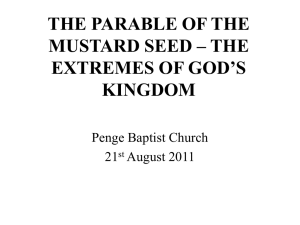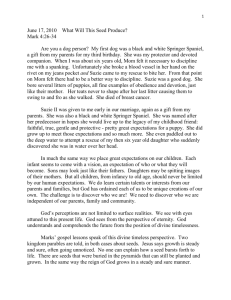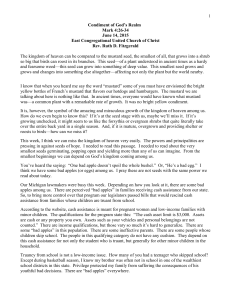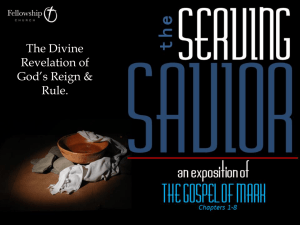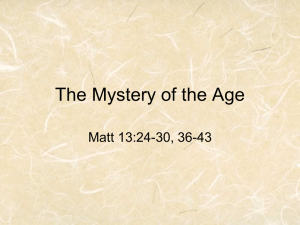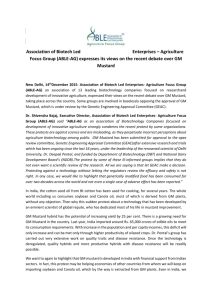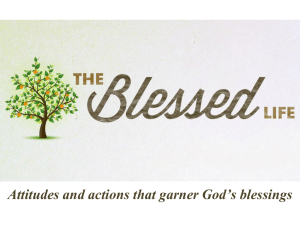the Sermon (Microsoft Word)
advertisement
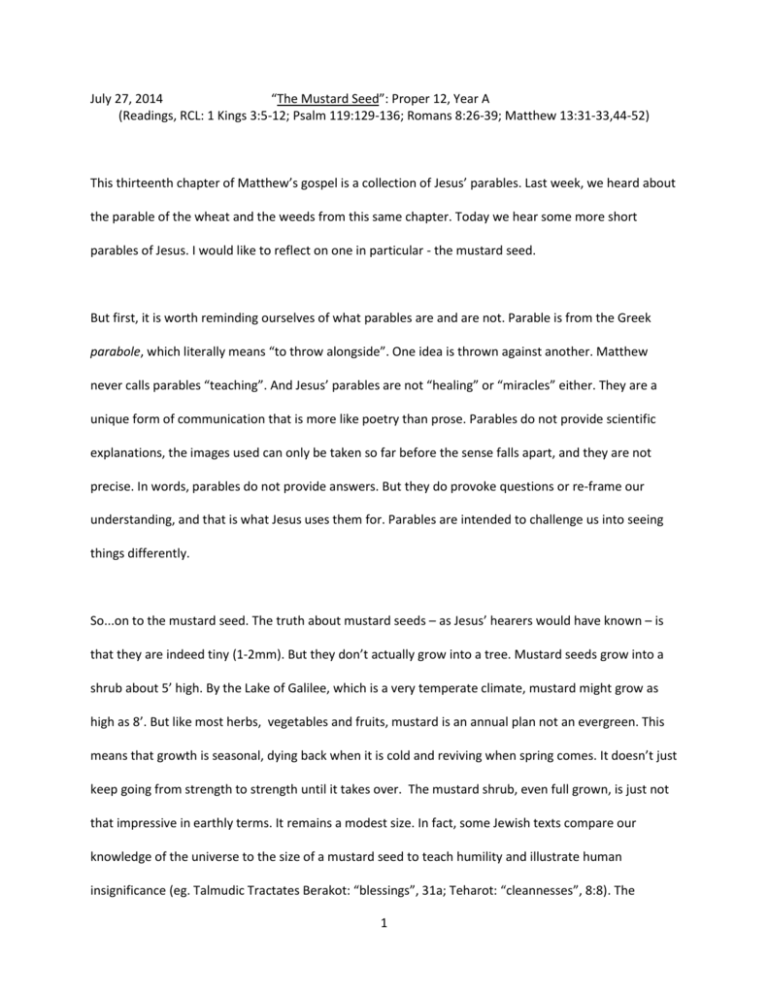
July 27, 2014 “The Mustard Seed”: Proper 12, Year A (Readings, RCL: 1 Kings 3:5-12; Psalm 119:129-136; Romans 8:26-39; Matthew 13:31-33,44-52) This thirteenth chapter of Matthew’s gospel is a collection of Jesus’ parables. Last week, we heard about the parable of the wheat and the weeds from this same chapter. Today we hear some more short parables of Jesus. I would like to reflect on one in particular - the mustard seed. But first, it is worth reminding ourselves of what parables are and are not. Parable is from the Greek parabole, which literally means “to throw alongside”. One idea is thrown against another. Matthew never calls parables “teaching”. And Jesus’ parables are not “healing” or “miracles” either. They are a unique form of communication that is more like poetry than prose. Parables do not provide scientific explanations, the images used can only be taken so far before the sense falls apart, and they are not precise. In words, parables do not provide answers. But they do provoke questions or re-frame our understanding, and that is what Jesus uses them for. Parables are intended to challenge us into seeing things differently. So...on to the mustard seed. The truth about mustard seeds – as Jesus’ hearers would have known – is that they are indeed tiny (1-2mm). But they don’t actually grow into a tree. Mustard seeds grow into a shrub about 5’ high. By the Lake of Galilee, which is a very temperate climate, mustard might grow as high as 8’. But like most herbs, vegetables and fruits, mustard is an annual plan not an evergreen. This means that growth is seasonal, dying back when it is cold and reviving when spring comes. It doesn’t just keep going from strength to strength until it takes over. The mustard shrub, even full grown, is just not that impressive in earthly terms. It remains a modest size. In fact, some Jewish texts compare our knowledge of the universe to the size of a mustard seed to teach humility and illustrate human insignificance (eg. Talmudic Tractates Berakot: “blessings”, 31a; Teharot: “cleannesses”, 8:8). The 1 mustard seed indicates how small and inconsequential the seed of the gospel appears, how obscure and hidden is the work of the kingdom, like yeast in the bread. We don’t usually like small. Small equals failure to thrive. A small group is an “unsuccessful” program or organization. Jesus’ parables also often include waiting. Yeast takes time to leaven the bread; mustard seeds take time to grow; it takes time for nature to grow the pearl in the oyster and then more time for the merchant to seek and find it. We don’t like waiting. Communication is faster and tends to be shorter all the time, from written letters to twitter and emoticons. Less time for nuance, balanced reflection. We are such an impatient people and getting more so, I believe. It is not surprising in our culture that sometimes faith feels foolish and as insignificant as a mustard seed because we take on trust what we do not yet see and cannot fully control. Ironically, sometimes the mustard seed is interpreted to be about the triumph of the church, and the rise and rise of Christendom, from a tiny seed to a tree that shelters the whole world. But these parables are not about the church, they are about the kingdom of God. It is so tempting to want to make God’s kingdom all about the church and what we do or are failing to do. In the UK we call home improvement Do It Yourself, or DIY. We may have an urge to DIY the Kingdom – do it yourself, get rid of the weeds, sort the wheat, to bring artificial closure to frustrating situations. We may decide what and who the problem is - to blame others for things that are simply part of living in a faith community: "If it wasn't for THOSE people, we could..." "If only the church would focus on x more and y less, ..." "If only the church had x or y..." "If only the church would stop doing x and y, then thus and such would happen”.. Some churches are so focused on numbers and growth that they judge themselves by that alone as a standard for "success", almost forgetting that we are not called to be "successful" but to be faithful, whether that involves achievements that the world would judge successful or not. If we take parables seriously, God is 2 not interested in “success”, or bigger barns. “Bigger, better and brand spanking new” is not the gospel. That is a contemporary American definition of success and worth. The mustard seed in fact challenges most of our definitions of success. Small and seemingly unimportant, barely noticeable, is where God it at work. I wonder - perhaps the mainline church is on the whole more faithful to God’s kingdom now than when 80% of people went to church? As a former bishop of Michigan used to say: “The American church of the 1950s was more like a country club than a gospel community.” Running through Jesus’ parables is a counterpoint to our quest for success and our understanding of it. Human powerlessness, waiting and watching is all part of the kingdom of God. And our frustration at our own frustration may ironically provoke us towards the very qualities that really are of the kingdom of God, including humility and patience -- both qualities of God’s own being. The mustard seed reminds us that God’s kingdom is quantitatively and qualitatively different from the kingdoms of this world. Different measurements and criteria apply. So we have this mustard seed kind of God. The God of small things. Of Abraham and Sarah, one wandering couple, of a Holy Family who are refugees, of one nation under oppression. Not as the world sees or notices does God work. Jesus heals some, but not millions. Jesus calls 12 disciples and then more, but they’re not the movers and shakers of the world. God is not interested in building an Empire. I find this oddly comforting, this mustard seed kind of God. The mustard seed says to me that the gospel, and the church which tries to bear the gospel into the world, will always be an alternative voice to the prevailing culture. Frankly, it will always be unappealing to many – too difficult, too obscure, asking too much compassion for others and giving too little immediate gratification. The gospel will always be a minority view. Even if for a time, the gospel seems to flourish in this world, it will only be for a season, until the church so successful that it is once again seduced by the world. But the God of small things will 3 always use the one to bless the many, and the small to bless the mighty, and what seems insignificant or marginal to transform the whole community. AMEN 4
